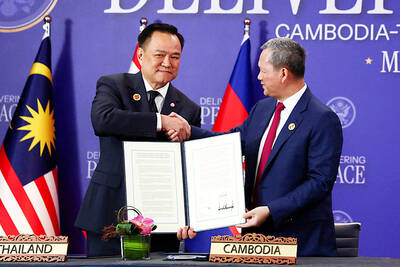An ethnic minority called off a two-week general strike in Nepal’s southern plains yesterday following an agreement with the government.
Shops, main markets, offices and educational institutions began reopening across the region known as Terai, as public and private transport resumed on major highways.
The strike had paralyzed nearly half of Nepal’s 75 districts with many places reporting shortages of essential items and food grain.
It had effectively cut off supplies of farm produce and fuel to many hill districts, including the capital Kathmandu.
The government and ethnic Tharu leadership reached a six-point agreement late on Saturday night.
Kathmandu agreed to remove the Tharu and other ethnic communities from a list that classified them under the dominant Madhesi group in the region.
The delisting was aimed at preserving minority rights and giving them priority for some public-sector jobs.
The government also agreed to provide compensation to the families of those killed and injured in violence during the strike.
At least five people, including a police officer, were killed and scores injured during two weeks of unrest.
The Maoist-led government has been struggling to deal with the demands of ethnic groups since it came to power last year.
Armed rebel groups are demanding greater autonomy and right to self-determination. Several attempts to bring them into peace negotiations have failed.
Over 250 people have been killed in ethnic violence in southern Nepal in the past two years.

Shamans in Peru on Monday gathered for an annual New Year’s ritual where they made predictions for the year to come, including illness for US President Donald Trump and the downfall of Venezuelan President Nicolas Maduro. “The United States should prepare itself because Donald Trump will fall seriously ill,” Juan de Dios Garcia proclaimed as he gathered with other shamans on a beach in southern Lima, dressed in traditional Andean ponchos and headdresses, and sprinkling flowers on the sand. The shamans carried large posters of world leaders, over which they crossed swords and burned incense, some of which they stomped on. In this

‘NO COUNTRY BUMPKIN’: The judge rejected arguments that former prime minister Najib Razak was an unwitting victim, saying Najib took steps to protect his position Imprisoned former Malaysian prime minister Najib Razak was yesterday convicted, following a corruption trial tied to multibillion-dollar looting of the 1Malaysia Development Berhad (1MDB) state investment fund. The nation’s high court found Najib, 72, guilty on four counts of abuse of power and 21 charges of money laundering related to more than US$700 million channeled into his personal bank accounts from the 1MDB fund. Najib denied any wrongdoing, and maintained the funds were a political donation from Saudi Arabia and that he had been misled by rogue financiers led by businessman Low Taek Jho. Low, thought to be the scandal’s mastermind, remains

Near the entrance to the Panama Canal, a monument to China’s contributions to the interoceanic waterway was torn down on Saturday night by order of local authorities. The move comes as US President Donald Trump has made threats in the past few months to retake control of the canal, claiming Beijing has too much influence in its operations. In a surprising move that has been criticized by leaders in Panama and China, the mayor’s office of the locality of Arraijan ordered the demolition of the monument built in 2004 to symbolize friendship between the countries. The mayor’s office said in

FIGHTING CONTINUES: Thai military dropped 40 bombs on border areas, Cambodia said, while Bangkok said Phnom Penh launched heavy attacks and damaged homes Cambodia yesterday accused Thailand of intensifying its bombardment of disputed border areas, even as officials from the two countries attend a multi-day meeting aimed at negotiating an end to deadly clashes. The neighbors’ long-standing border conflict reignited this month, shattering an earlier truce and killing more than 40 people, according to official counts. About 1 million people have also been displaced. Cambodian and Thai officials were in their third day of talks at a border checkpoint, with ministers of defense from the two countries scheduled to meet today. However, the Cambodian Ministry of National Defense said Thailand’s military carried out a heavy